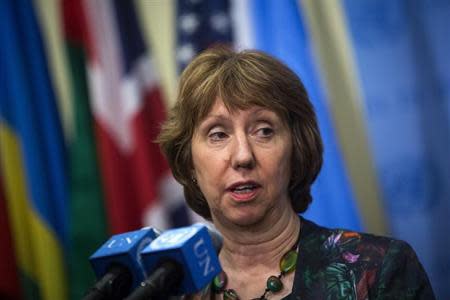EU's Ashton says crucial for all to join Egyptian political process

By Michael Georgy CAIRO (Reuters) - European Union foreign policy chief Catherine Ashton urged Egypt's army-backed government and Muslim Brotherhood on Thursday to take part in an inclusive political process - but neither side seemed prepared to heed the call. Egyptian authorities have mounted a crackdown against the Islamist movement since the army ousted Islamist President Mohamed Mursi in July and announced a political "roadmap" it promised would lead to new elections. Hundreds of Brotherhood members have been killed and leaders have been jailed on charges of inciting violence or taking part in it, allegations they deny. The group has rejected the roadmap and said it cannot work with the military because it deposed Egypt's first freely elected leader. The military seems bent on eradicating the Brotherhood, which won every election since a popular revolt toppled autocrat Hosni Mubarak in 2011. Previous governments tried but failed to eliminate the Brotherhood, the oldest Islamist movement in Egypt. "It is important to find ways to have the right kind of dialogue and that's what we have been urging everyone," Ashton told reporters after meeting army chief General Abdel Fattah al-Sisi, who toppled Mursi. "My guess is that process will take a little time to do but it's important for everybody to feel that they are able to participate in the process as well as ultimately in political life," added Ashton, who also met interim president Adly Mansour and liberal and Islamist politicians. ECONOMY SUFFERS The political crisis, along with a rise in attacks by Islamist militants in the Sinai Peninsula, have hit tourism and investment in the most populous Arab state and raised questions about its democratic credentials. Ashton said the European Union was not involved in mediating any talks. She and several other Western envoys failed in August to persuade the military to avoid using force against Mursi supporters. Security forces, including what witnesses said were snipers, crushed pro-Mursi protest camps on August 14, killing hundreds of people. The Brotherhood's leaders were rounded up in a bid to cripple the movement. A court has now banned the group and ordered its assets frozen. Amr Darrag, a Muslim Brotherhood politician who met Ashton on Wednesday, said there had been no talk of "initiatives or solutions". "We continue to say that Mursi is the elected president," Darrag told reporters. Many Egyptians turned sharply against the Brotherhood after concluding that Mursi had tried to give himself sweeping powers and mismanaged the economy during his year in office. Sisi has emerged as the most popular public figure and analysts say he would become president if he ran for office. He is seen as a decisive leader who can restore stability. Asked whether Sisi would contest polls, Ashton said the European Union had no view. "It's up to individuals to decide whether they will be a candidate in the election or not," Ashton said. The rival sides have called on their supporters to demonstrate in central Cairo on Sunday, raising the prospect of renewed violence on the streets. In a statement on Thursday, the Brotherhood denounced the army, comparing it to Adolf Hitler. The army-backed government says the Brotherhood has committed terrorist acts. Ashton expressed concern over the situation in the Sinai, which has been gripped by violent disorder since the army toppled Mursi and plunged the country into political turmoil. Almost daily attacks by al Qaeda-inspired militants in the Sinai have killed more than 100 members of the security forces since Mursi's overthrow, the army spokesman said on September 15. Militant violence elsewhere in Egypt has raised concerns that an Islamist insurgency, like one eventually crushed in the 1990s by Mubarak's government, could take hold beyond Sinai. The Sinai-based Ansar Bayt al-Maqdis group claimed responsibility for a failed suicide bombing in Cairo on the interior minister last month. Instability in Sinai worries Western governments because the peninsula borders Israel and flanks the strategic Suez Canal. (Additional reporting by Hadeel Al-Shalchi; Editing by Angus MacSwan)

